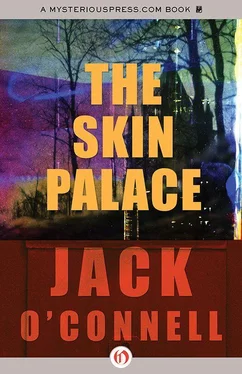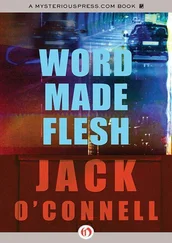“I’m thinking H. B. Halicki,” Sylvia says.
“Very good,” Propp says.”I’m impressed. Halicki, the Patron Saint.”
“Gone in 60 Seconds,” Sylvia says. “Ninety-three cars destroyed in forty minutes.”
“How about Grand Theft Auto ?” Propp says.
“Eat My Dust!” Sylvia says. “Smash-Up on Interstate 5.”
“The Seven-Ups. Dirty Mary and Crazy Larry.”
“White Line Fever. Freebie and the Bean. Le Mans.”
“The Cannonball Run series,” Propp says. “My God, you could get through the first three months on Burt Reynold’s oeuvre alone. But the rumor is they’re going to use industrial films as well. Stuff out of these Detroit labs where they test cars. And underground video stuff borrowed from state police files. There’s supposed to be some Autobahn footage where you can see a head come right through a windshield.”
“You think they’ve got a shot?” she says.
Propp smiles at her and says, “I don’t see how they can miss.”
He opens the skylight back on its hinges and gestures for her to climb in.
“No alarms?”
“Not that I know of.”
Sylvia moves into the opening and lowers herself, then lets go and drops down to the floor in a squat. She gets up and steps back and Propp joins her, agile for his age and looking like he’s done this a lot in the past.
They’re in the balcony of the theatre, about a dozen rows pitched at a steep angle. Sylvia’s always loved the seats in the Ballard, old-time rockers covered in plush maroon velour and plenty of arm room so you’re not in constant battle with the person next door. Sylvia and her mother used to come to the Ballard a lot when Sylvia was young. They saw a lot of Disney stuff here, a lot of movies starring Kurt Russell. Sylvia hoped her first boyfriend would be like Kurt Russell — clean-cut, square jaw, well intentioned.
“You pick the seats,” Propp says, “and I’ll go fire up the projector.”
He climbs back to the projection booth and she surveys her choices and settles on the front row center where they can put their feet up on the railing. She sits down and gets comfortable and looks around at the decor, all natural wood and soft velour. And the sight of it all makes her hate the mall theatres even more — the little bowling alleys with their back-ache chairs and tiny screens and bad sound systems.
Last year Perry and she went to a Friday night late show of Castle Oswald and when the lights went down and the previews came on they thought there was something wrong with their eyes. The people on the screen were just ghost-images. If you squinted hard, you could barely see a man and a woman running through a park. They waited for someone else to get out of their seat and find an usher but no one did. So Sylvia got up and went out to the concession stand where all these teenagers in polyester jackets were busy trying to pick each other up. And she asked them if there was a problem with the movie. The assistant manager put down his massive tumbler of soda and explained with strained politeness that, in fact, one of the bulbs in the projector had burned out and that she could get her money back at the box office if she wanted. He turned back to the popcorn girl and Sylvia asked why they didn’t just change the bulb. The boy’s patience edging toward rupture, he told her the bulb was too hot to be changed now, that it would be changed tomorrow morning. Then he pursed his lips and breathed through his nose waiting to see if there was anything else she needed. Sylvia asked him if anyone else had requested their money back and he seemed pleased to tell her she was the first one. On the drive home she can remember Perry saying, “It’s no big deal, Sylvia. I’m not crazy about the movies anyway.”
And now she stares out at the huge old screen in front of her as the heavy blue curtain starts to roll back and she wonders how could I end up with a guy who isn’t crazy about the movies?
Propp does a fast trot down the inclined aisle, braking against gravity, slides in next to her and says, “Exactly where I’d have sat.”
“Glad you approve.”
They watch leader strip fill up the screen, a scratchy-looking test pattern that shows a color spectrum.
Propp leans into her shoulder and whispers, as if the theatre were filled and they might disturb someone. “Remember, the reduction to sixteen millimeter is going to be painful. I’m pretty sure this was done on the run. And the sound track isn’t quite in sync.”
“Please,” Sylvia says, “don’t build my expectations so high.”
He gives her elbow a playful shove off the armrest and they turn their attention to the screen. An old-time clap-board comes up that reads 11/5/38, then the marker is pulled down out of the shot and they’re watching Judy Garland looking beautiful in spite of the start of all the diet pills and bad advice.
The sound track is a mess. Ray Bolger walks into view done up in full Scarecrow costume. As a child, Sylvia’s favorite of the three traveling companions was Bolger and at the end of the movie, when Dorothy tells him she’s going to miss him the most, Sylvia instantly wanted her to stay in Oz. Forget Auntie Em. Forget Kansas. And now, watching the Scarecrow lean over and whisper in Garland’s ear, making her laugh with some secret no one will ever know, she feels Dorothy’s making a huge mistake all over again. You can’t go home again, girlfriend. So bag the thought of a dicey balloon trip with the faux wizard. And forget the heel-clicking mantra of Glinda, the little overachieving cheerleader. Hit the road with the Scarecrow and go assume the mortgage on the Witch’s castle. You can train those flying monkeys to keep house and do the cooking. And you and strawboy can head out every night, dance and get weird in the deepest part of that haunted forest.
There’s an awkward cut and the film goes dark for a second and when the light comes back, the Scarecrow is up on his post at the fork in the yellow brick road. His voice gives Dorothy confusing directions a few seconds after his hands point down the proposed path she should walk. It’s unsettling watching this — the images mimic, almost perfectly, the images that Sylvia’s known from this film most of her life. But almost is a crucial word. There’s something just a hair off at all times, something that doesn’t exactly line up. Something beyond the out-of-sync sound track.
Sylvia has watched this movie at least once a year since she was five or six years old. More, once it was released on video. That means she’s seen it over twenty-five times, enough to have the nuances, the inflections of voice, the exact manner of movements, down to a reflexive memory. It’s akin to that instinctual, really helpless way you know a pop song note for note after you’ve heard it a hundred times. You sing along in your head and you know, without thinking, without even being aware that you know, when the singer’s voice is going to alter, to drop or rise or quiver. It’s a buried surety, a certainty that’s grown so innate it’s like breathing air.
And now, watching Bolger and Garland, Scarecrow and Dorothy, play out movements that almost match up to what she knows should be happening, but don’t quite, it’s akin to hyperventilating. It’s an awful confusion. Because she can’t even identify what’s wrong. She just knows something is off. Scarecrow’s arm might move an inch beyond the length it extended in the standard version of the movie. Dorothy’s voice might rise just a bit higher. The choreography is the same. The words are the same. But their presentation is just a millimeter away from what she’s come to memorize. And as the differences continue between what she sees each moment and what she expects to see, she begins to feel a kind of vertigo, a dizziness, a sense of displacement, an apprehension that the whole world has just slipped out of a balance that she thought was inviolable. If the Scarecrow can act in a different way than he’s always acted, then science and religion are destroyed. Then anything can happen to her life.
Читать дальше











